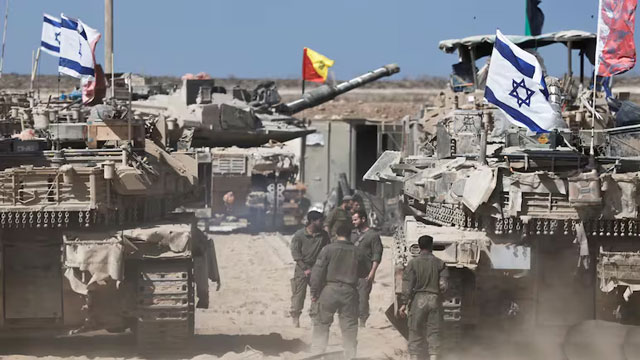Daijiworld Media Network - Gaza
Gaza, Oct 20: Gaza’s fragile ceasefire faced a severe test on Sunday as Israeli forces launched a series of deadly airstrikes, killing at least 36 Palestinians, after Hamas militants allegedly killed two Israeli soldiers. The escalation temporarily halted the transfer of humanitarian aid into the war-ravaged territory, officials confirmed.
An Israeli security official later said aid deliveries will resume Monday, adding that Israel has resumed enforcing the truce. The official spoke on condition of anonymity as he was not authorised to address the media.

The flare-up came just over a week after the start of the U.S.-brokered ceasefire, aimed at ending nearly two years of relentless war. U.S. President Donald Trump affirmed that the truce “remains in place,” saying, “We want to make sure it’s going to be very peaceful.”
Speaking aboard Air Force One, Trump noted that Hamas had been ‘quite rambunctious’, suggesting that recent violence might stem from “rebels” within the group rather than its leadership. “It’s going to be handled toughly but properly,” he said, adding that the situation was “under review.”
U.S. Vice President JD Vance hinted at a possible visit to Israel in the coming days to assess the ceasefire’s progress, saying the process would have “fits and starts.”
Deadly strikes across Gaza
Health officials in Gaza reported that 36 Palestinians, including children, were killed in multiple strikes. Israeli forces said they launched retaliatory attacks after troops came under fire in Rafah, an area designated under ceasefire control lines.
Airstrikes hit Nuseirat, Bureij, and Beit Lahiya, as well as a makeshift coffeehouse in Zawaida and a tent settlement in Khan Younis, where a woman and two children were among those killed. Hospitals in central and southern Gaza were overwhelmed with casualties.
“Where is peace?” cried Khadijeh Abu-Nofal, who accompanied an injured relative to Nasser Hospital in Khan Younis, as medics treated wounded children.
Ceasefire mediation efforts
A senior Egyptian official said “round-the-clock contacts” were underway to contain the violence. Israeli Prime Minister Benjamin Netanyahu instructed his military to take “strong action” against ceasefire violations but refrained from threatening a return to all-out war.
Hamas denied involvement in the latest attacks, claiming that communication with its Rafah units had been cut off “for months.”
Hostage remains identified
Israel confirmed the recovery of the bodies of two hostages—Ronen Engel, a father from Kibbutz Nir Oz, and Sonthaya Oakkharasri, a Thai worker from Kibbutz Be’eri—both believed killed during the October 7, 2023 Hamas assault that triggered the war.
Hamas has so far handed over the remains of 12 hostages and offered to return another, “if conditions permit.”
Israel maintains that Hamas has yet to return all 28 confirmed deceased hostages, keeping the Rafah border crossing closed “until further notice.”
Toward phase two of the ceasefire
A Hamas delegation, led by negotiator Khalil al-Hayya, arrived in Cairo to discuss the next phase of the ceasefire, which includes disarmament, Israeli troop withdrawal, and the formation of an internationally backed governing authority for postwar Gaza.
Hamas spokesperson Hazem Kassem said the group will not take part in any future ruling body but supports a technocratic Palestinian administration to prevent a power vacuum.
The Israel-Hamas war has killed over 68,000 Palestinians, according to Gaza’s Health Ministry, which says thousands remain missing. The conflict began after Hamas-led militants killed around 1,200 Israelis and abducted 251 people during the 2023 cross-border attack.
As Gaza reels from the latest bloodshed, hopes for a durable peace appear once again on shaky ground.